Department of Agricultural Science and Technology
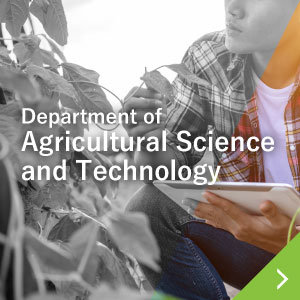
Culture, produce.
We study the relationship between crop production and the environment to ensure a stable production of agricultural products.
We also take on the challenge of developing new technologies with the aim of efficiently producing safer and tastier food.
Key Points of Study
01Creating a production environment that provides a stable supply of food
Students learn in depth about sustainable food production, stable food supply, and food production environments, while developing the ability to create new agricultural products.
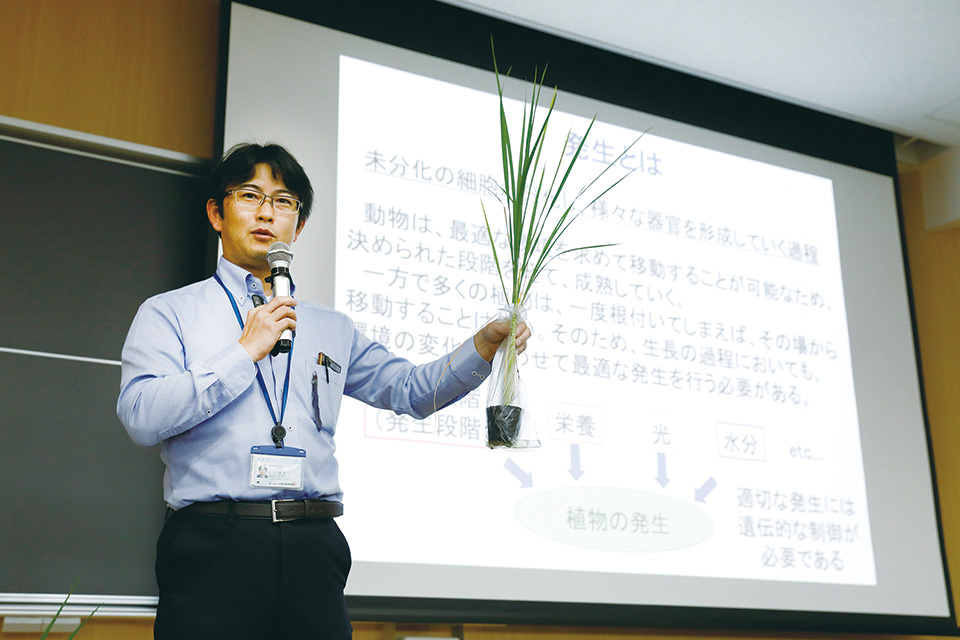
02Learn the theory and practice of cultivation through a wide range of practical exercises
Through experiments and on-farm training, students learn the theory and practical skills of cultivation in food production, and are educated to develop the ability to solve problems coming along with it.
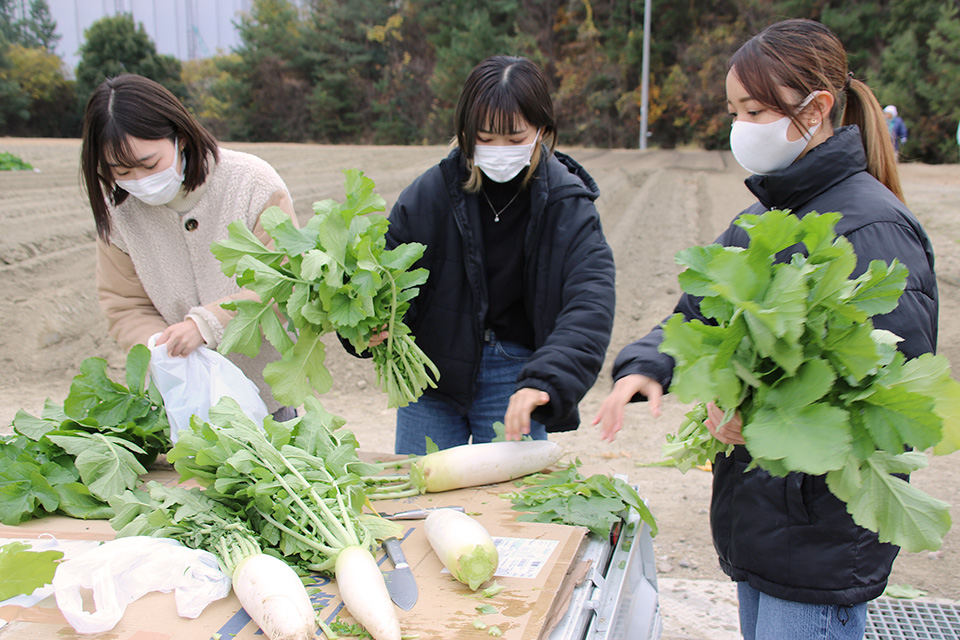
03Fostering human resources with a sound understanding of agriculture and the ability to contribute to a sustainable production
We educate students to learn deeply about the realities of agriculture in Japan and abroad, as well as advanced agricultural technologies, and to develop human resources who can contribute to advanced agriculture with profound knowledge, skills, and passion.
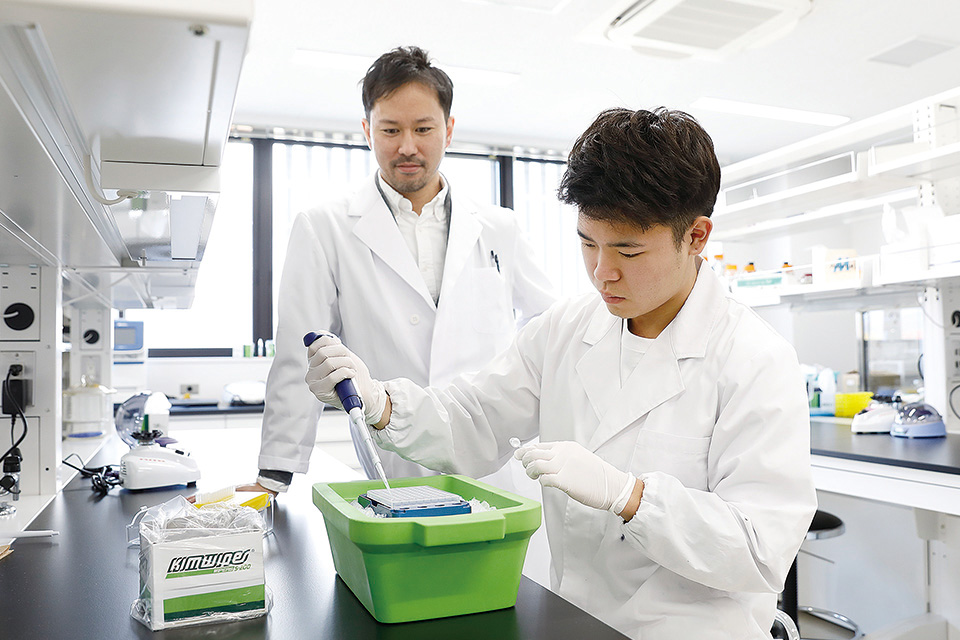
Curriculum
Students learn solutions to various problems in crop production, including advanced agriculture that enables labor-saving, high-yield, high-quality production.
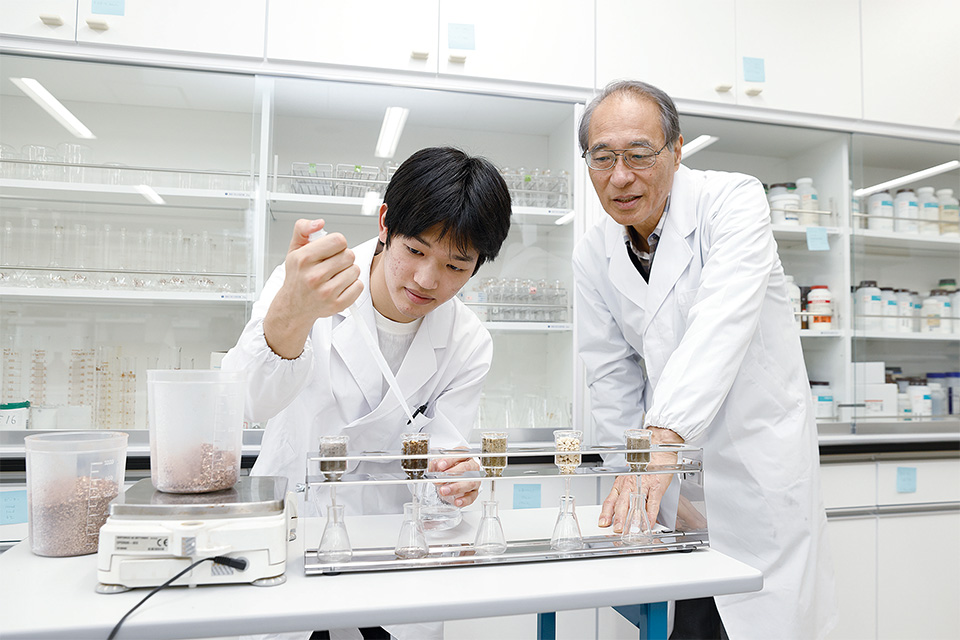
●Compulsory Courses
Scroll left/right
| Year 1 | Year 2 | Year 3 | Year 4 | |||
|---|---|---|---|---|---|---|
| Specialty Subjects |
Common Courses |
●Introduction to Agriculture ●Basic Seminar in Agriculture |
Seminar in Global Agriculture | Seminar in Smart Agriculture Agricultural Meteorology |
Forest Ecology Agricultural Intellectual Property |
|
| Specialty Core Courses |
Fundamental Courses | ●Fundamentals of Chemistry ●Exercises in Basic Chemistry ●Fundamentals of Biology ●Exercises in Basic Biology ●Introduction to Agricultural Science and Technology ●Bioethics Fundamentals of Physics |
Biostatistics | |||
| Agricultural Plants and Cultivation Courses | Plant Genetics Crop Functional Morphology Plant Physiology |
●Plant Breeding ●Crop Science ●Olericulture and Floriculture Plant Breeding Methodology General Crop Science Pomology |
Arable Ecology Protected Horticulture |
|||
| Agricultural Biology and Environment Courses | ●Plant Pathology ●Applied Entomology ●Soil Science Plant Pathogens and Disease Development Insect Physiology and Ecology Plant Mineral Nutrition |
Biodiversity Soil Microbiology Plant Disease Management Insect Pest Management Weed Management |
||||
| Advanced courses | Ecology Livestock and Companion Animals Marine Biology Molecular Biology of the Genome I Biotechnology Biochemistry I Farm Business Food Industry Distribution of Agricultural and Livestock Products Farm Business Management Sextiary Industry Management Urban Agriculture |
|||||
| Experiments and practical training | ●Experiments in Chemistry ●Experiments in Biology |
●Basic Experiments in Agricultural Science and Technology I ●Basic Experiments in Agricultural Science and Technology II ●Field Practice in Agricultural Science and Technology I ●Field Practice in Agricultural Science and Technology II Field Practice in Agriculture |
●Experiments in Agricultural Science and Technology Experiments in Physics |
|||
| Specialty Comprehensive Courses |
Applied Biology Courses | Biology of Plants Microbiology Biology of Animals |
||||
| Food and Nutrition Courses | Food Safety Nutrition and Sports Health and Society |
|||||
| Food and Agriculture Business Courses | Food and Agricultural Economics Food System Agricultural Diversity |
|||||
| Seminars and graduation research | ●Freshman Seminar | ●Introductory Study for Graduation Research | ●Graduation Research | |||
| General Education Subjects | Language Courses | Japanese Reading and Writing Basic English Ia Basic English Ib Basic English IIa Basic English IIb |
Practical English I Practical English II Chinese I Chinese II |
Basic English Conversation a Basic English Conversation b |
||
| Overseas Language Training | ||||||
| IT Courses | ●Information Literacy I Information Literacy II |
|||||
| Physical Education | Sports Science I Sports Science II |
|||||
| Cultural Studies | Psychology Ethics Philosophy Regional Geography Human Geography Literature |
Cultural Anthropology Women’s Studies |
||||
| Social Studies | Study of Volunteer Activity Introduction to Economics Japanese Politics Introduction to Jurisprudence Introduction to Management Tourism Studies |
Japanese Constitution | ||||
| Natural Sciences | Mathematics | Life and Environment | Earth and Space Science Experiments in Earth Science |
|||
| Career | ●Career Design I | Career Design II Development of Mathematical Ability |
Basic Internship Practical Internship |
|||
| For International Students | Japanese Culture and Society FI Japanese Culture and Society FII Japanese Reading F Japanese Grammar F Japanese Reading and Writing F Comprehensive Japanese F Japanese for Specific Purposes F Japanese Conversation F |
|||||
| For Returning Students | Japanese Culture and Society RI Japanese Culture and Society RII Japanese Reading R Japanese Grammar R Japanese Reading and Writing R Comprehensive Japanese R Japanese for Specific Purposes R Japanese Conversation R |
|||||
Laboratories
Encountering today’s challenges of agriculture
The Department of Agricultural Science and Technology has six laboratories mainly addressing two fields: “Agricultural plants and cultivation” and “Agriculture Biology and Environment”. For the development of agriculture, which is a key industry in Japan, the Department of Agricultural Production will focus on the further development and efficient utilization of facilities, equipment, and agricultural materials; the development of breeding and cultivation techniques that are resistant to diseases and environmental stress such as high and low temperatures; the development of production techniques for highly resistant and high-quality crops; the development of disease control and fertilizer application techniques with low environmental impact; the development of labor-saving, light labor methods, etc. We will conduct research with the aim of solving various agricultural problems, such as establishing a stable year-round supply system, developing and practicing sustainable farming methods, and developing environment control technologies.
Department of Agricultural Science and Technology
Department Head Masahiko TAMAKI
Agricultural Plants & Cultivation
Laboratory of Plant Genetics and Breeding Science
Kazuhiro SATO
[Professor]
Tomokazu USHIJIMA[Associate Professor]
Laboratory of Crop Science
Masahiko TAMAKI[Professor/Department Head]
Michio KAWASAKI[Professor]
Laboratory of Horticultural Science
Toshiki ASAO[Professor]
Yuto KITAMURA[Lecturer]
Agricultural Biology & Environment
Laboratory of Plant Pathology
Yasuyuki KUBO[Professor]
Yuichiro IIDA[Associate Professor]
Laboratory of Applied Entomology
Naoya OSAWA[Professor]
Takeshi Fujii[Associate Professor]
Laboratory of Production Ecology
Shuji SANO[Professor]
Daisuke TAKAGI[Lecturer]
Laboratory of Plant Genetics and Breeding Science
Around 400 million years ago, green plants appeared on terrestrial land for the first time. Since then, plants have evolved while being exposed to various environmental stresses. Plants might have been accumulating many genetic factors which can sense the fluctuating environments and can optimize their development and growth under environmental stresses. To catch up with climate change, we need to develop crop varieties which can realize the stable high productivity under the advancing global warming. To breed a promising crop variety, we aim to elucidate how plant can respond to environmental stresses.
Kazuhiro SATO[Professor]
Utilization of plant genome diversity for breeding

Tomokazu USHIJIMA[Associate Professor]
Breeding plants that are resistant to environmental changes
Plants are exposed to a variety of environmental changes on a daily basis.
Plants have been able to overcome the changes in their environment by using
various genes. Our goal is to study the functions of the genes that plants have
used to adapt to their environment, and to use these mechanisms to develop
new varieties that can withstand environmental changes.
Breeding using environmental response mechanisms in plants



Laboratory of Crop Science
Food crops, such as cereals, legumes, and root and tuber crops, play an important role in our diet and daily life. We aim to contribute to the food and livelihood of mankind by conducting education and research on the physiological, ecological, and morphological characteristics of these crops, their response mechanisms to the cultivation environment, and the development of production methods and technologies that improve crop productivity and are environmentally friendly.
Masahiko TAMAKI[Professor/Department Head]
Let's challenge to cultivate crops incorporated new technologies
We aim to establish crop cultivating methods incorporated new technologies that can improve the productivity and quality of crops, be environmentally friendly, and interesting to the younger generation. We will work to use new ways in the field of crop science, aiming to contribute to the food and lifestyle of mankind.
Productive and environmentally friendly crop cultivation


Michio KAWASAKI[Professor]
Scientific studies of food crops on morphology, environmental response, growth, and cultivation
My research activity is focused on analysis of the morphology and the relationships between morphology and functions in food crops, such as yam, eddo, rice, soybean. In addition, I have been studying the effects of environmental factors such as elevated CO2, high and low temperatures, salts, and calcium on the growth, morphology, and physiology in the food crops for contributing to the development of agriculture and society.
Scientific Studies of Food Crops on Functional Morphology, Environmental Response, Growth and Cultivation



Laboratory of Horticultural Science
We educate and research on the production of potassium-controlled vegetables for dialysis patients and athletes, as well as develop environmentally friendly hydroponic cultivation technology through nutrient solution recycling. In addition, breeding new cultivars for local branding and sustainable cultivation in fruit tree crops are also targeted based on the knowledge of genetics and molecular biology.
Toshiki ASAO[Professor]
Potassium control in vegetables and Recovery of autotoxicity


Yuto KITAMURA[Lecturer]
Science of fruit season & promotion of local industries
Our tables are colorfully decorated by various fruit crops, which are born in the specified season. My research themes are the regulation of annual lifecycle, environmental effects, and artificial control on the “seasonal fruits”. Furthermore, the creation of noble fruit resources which can be local specialties by taking advantage of new genetic/molecular breeding techniques is also aimed.
Environmental Responses and Breeding in Fruit Trees


Laboratory of Plant Pathology
The damage caused by pathogens results in the loss of food for 800 million people a year. In our laboratory, we are trying to elucidate how fungal pathogens infect plants and how useful microorganisms prevent fungal pathogens, and to contribute to the development of new technologies of crop protection.
Yasuyuki KUBO[Professor]
Plant Pathology Saves the World
Plants, like people, get sick by microbial infection. Viruses, bacteria, and fungi are the main pathogens. Among these, filamentous fungi (molds) account for about 80% of plant diseases and cause significant damage to agricultural production. Elucidating the infection mechanism of filamentous fungi will lead to the development of pest control chemicals and disease-resistant plants with less impact on the plant environment. Molecular dissection of the infection mechanism of pathogens can be applied to the development of new plant protection technologies.
We have shown that rice blast, the most important disease of rice, can be controlled by inhibiting the synthesis of melanin pigments. We have also revealed the mechanism by which anthracnose fungi recognize plant surfaces and establish infection by evading plant immune response. In addition, the genome structure of anthracnose fungus, Colletotrichum orbiculare has been clarified, providing the basis for the molecular analysis of pathogenicity.
The interaction between plants and pathogens is explained in an easy-to-understand manner in "Plants at War" (Chapter 2) in Kodansha Bluebacks, edited by the Phytopathological Society of Japan.
Research on infection mechanisms of plant pathogens


Yuichiro IIDA[Associate Professor]
Microorganisms that fight pathogens and protect plants from disease
Just as humans get sick, plants also get diseased from attacks by various phytopathogens. Our research activity is focused on the analysis of molecular mechanisms for both "friends" and "foes" microorganisms: how pathogens infect plants and how effective microbes control pathogen. The ultimate aim is to develop new pathogen control techniques and microbial fungicides to protect crops.
Molecular mechanism of biocontrol microbes


Laboratory of Applied Entomology
Control of insect pests is indispensable for stable production of agricultural products. However, pest control has been overly dependent on insecticides, which often caused concerns about the toxicity of residual chemicals on food as well as the appearance of insecticide-resistant populations. In our laboratory, we study physiological, biochemical, and molecular biological bases of insects’ outstanding ability to adapt to diverse environments. We believe our studies will lead to development of novel insect control measures, because disruption of mechanisms that underlie their adaptability will be fatal to their lives.
Naoya OSAWA[Professor]
Takeshi Fujii[Associate Professor]
Insect science of chemical communication
One of the reasons “Insects” has succeeded in adapting to multi-environments on Earth is that insects were able to increase the fitness by the inter- and intra-communication via chemical information from the outside. One of my interests is understanding at the molecular level how the chemicals, such as "odorant" or “tastes”, determine the insect behavior, and exploring the possibility of protecting crops by controlling the behavior of insects by human beings using these chemicals.
Exploration of Lipid metabolism in Insects


Laboratory of Production Ecology
Soil is the basis of agricultural production. Depending on the unsuitable field management such as application of chemical fertilizers and compost for the cultivation of crops and water irrigation, and terrible environment due to the extreme weather, soil productivity will be poor. Indeed, the change is hard to see visually. Therefore, in order to properly manage the soil, it is important to establish a simple method for evaluating the physical and chemical properties of the soil and the flora of rhizosphere microorganisms. In our laboratory, after knowing various properties of soil, we will conduct cultivation tests of crops under various managements and proceed with research on the characteristics and management methods of fertile soils.
Shuji SANO[Professor]
Improvement of soil evaluation methods to bring out the best in soil for promotion of agricultural productively and environmental conservation
Soil is the basis of agricultural production; supplies the sufficient water and nutrient for crops as well as keeps the crop bodies and buffers the undesirable condition such as high temperature. Soil is also related to some global environmental problems such as greenhouse gasses emission. Therefore, field management based on suitable evaluation of soil condition can contribute to promotion of agricultural productively and environmental conservation. My research mainly focuses on the labile organic matters since they affect the various soil properties. The research field is not only agricultural land but also other ecosystems.
Development of soil evaluation procedure for sustainable agricultural production and environmental conservation



Daisuke TAKAGI[Lecturer]
The physiology of photosynthesis in land plants



Assistant Professor/Research Assistant
Sayo KODAMA[Assistant Professor]
Research on plant sensing for infection-related morphogenesis of phytopathogenic fungi
Plants get sick by fungi, viruses and bacteria. Fungi recognize various environmental cues and start invasion in response to plant surface signals. My research focuses on the molecular mechanisms how fungal pathogen senses and responses to plant signals.
Plant surface signal responses for infection-related morphogenesis of phytopathogenic fungus


Shin YABUTA[Assistant Professor]
Tropical crops that support our lives
What comes to mind when you think of foods cultivated in tropic region? Tropical fruits as durian and mango, long grain rice and coffee attracts us by its flavor and bitter taste… But also a large portion of indispensable items such as palm oil, sugar, cassava starch are imported. Improvement and stabilization of agriculture in import source regions has two meanings, international cooperation and stable food supply for Japan heavily depending on foreign countries. In addition, research on tropical regions and their agriculture will help prepare for environmental changes caused by global warming. Thus, I have a great interest in utilization and cultivation of crops including tropic origins.
Cultivation and Utilization of Tropical Crops



Kenta WATANABE[Assistant Professor]
Smart farming: solving problems at production sites by advanced technologies
Have you ever heard of “smart farming”? Currently, there is a serious labor shortage in the agricultural industry due to the aging of farmers and the decreasing number of growers. Furthermore, considering issues such as global warming and increasing fertilizer prices, sustainable agriculture that makes more effective use of limited land and resources than ever before is necessary. Smart farming enables to solve these problems using advanced technologies such as robots and drones. I have been involved in research to promote smart farming for sugarcane, which is an important crop in Okinawa Prefecture. From now on, however, I would like to apply the technologies to other crops as well.
Studies on improvement in crop productivity and smart farming



Career Paths and Certification
Contribute to the future development of agriculture
The program aims to educate specialists with the ability to scientifically elucidate the relationship between food and the biological and non-biological environment surrounding them, and to disseminate and provide guidance on agricultural production technology in the “field” of agricultural production, including crop improvement, development of optimal cultivation methods and new production technology.
Certification (optional)
Junior High School Teacher’s License (Science)
High school first-class teacher’s license (Science)
High School Teacher’s License (Agriculture)
Career paths after graduation
As a professional with broad knowledge of agricultural science, amongst others the following career paths are possible.
- Agriculture-related companies and organizations
Technical and sales positions in companies engaged in seeds and seedlings, agricultural materials, food and beverages, chemicals, etc.
Technical and sales positions in biotechnology-related companies
Technical and sales professionals in the construction and landscaping industry
Sales representative for food and other distribution and sales companies
Technical and sales staff of agricultural cooperatives and agricultural production corporations - National and public agricultural institutions and administrations
Agricultural technicians at agricultural experiment stations, agricultural technicians and agricultural policy makers at national and local governments - Professions in Education
Teachers of agricultural high schools and high schools with agricultural departments, middle and high school science teachers - Graduate School Entrance